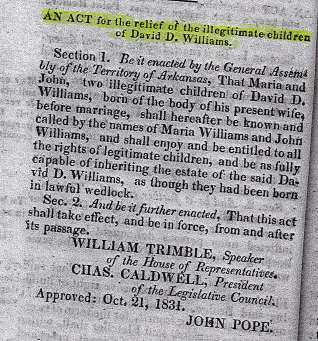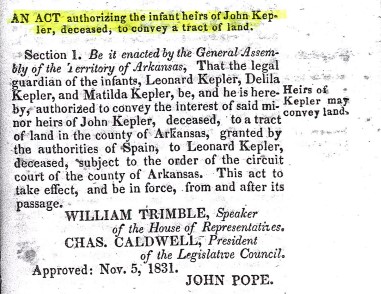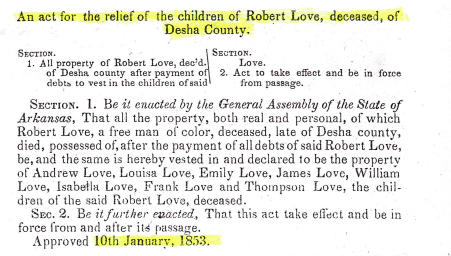calsfoundation@cals.org
Found Family Facts: Looking at Guardianship
An email from a patron researching family history was recently forwarded to the genealogy reference desk in the CALS Roberts Library Research Room, asking about guardianship laws in Arkansas around 1850. A frequent reference work for us is the Acts of Arkansas, a collection of books publishing bills enacted in Arkansas by the state legislature. Browsing this collection did not provide a definitive answer to the question, but it did provide examples of guardianship documented in the official written history of Arkansas.
For example, the 1832 volume of the Acts of Arkansas includes a decision for the “relief of the illegitimate children of David D. Williams, dated October 21, 1834.” It lists Maria and John as two illegitimate children of David, born of his present wife. This act states that Maria and John “shall enjoy and be entitled to all the rights of legitimate children.” This gives the children the legal ability to inherit David Williams’s estate like children who were born in wedlock would be guaranteed.

Another example in the 1832 volume authorizes the “infant heirs of John Kepler, deceased, to convey a tract of land.” The children are Leonard Kepler, Delila Kepler, and Matilda Kepler. The land, in the county of Arkansas, was granted by the authorities of Spain. This act was approved on November 5, 1831.

On January 10, 1853, an act for the relief of the children of Robert Love of Desha County, deceased, is included. This act grants all property, both real and personal, “of which Robert Love, a free man of color,” possessed, to be given (after payment of all debts) to his children. His children are: Andrew, Louisa, Emily, James, William, Isabella, Frank, and Thompson. Robert Love is listed as a “free person of color” in the 1840 U.S. Census. According to the census, he is living in Bartholomew township, Desha County, Arkansas. Two males and two females under the age of ten also live in the home. Two males between the ages of ten and twenty-three are in the home. One female between the ages of ten and twenty-three is in the home, as well as one female age thirty-six to fifty-four. Ten years later, the 1850 U.S. Census shows Andrew Love, age twenty-five, living in the home of William and Amelia Rude with their three children: Allen, Rachel, and James. Isabella Love is living in the home of Isaac and Luisa Turner and their children: Robert and Szore. A twenty-two-year-old named John McGrath also lives in this home. Thomas and Frank Love are living in the home of George C. and Francis Britt, their child Eliza, and a twenty-five-year-old named John Neighbours. The 1850 census also lists Rachel Love living in Napoleon township, Desha County, with her daughter, eight-year-old Rachel.

For the researcher who emailed looking for information, these details led to further questions worth answering. Finding these facts in the Acts of Arkansas gives detail to lives that may not show in other documents, so this situation serves as a reminder to look in areas not considered a high priority for family names to be mentioned. It’s also a reminder to drop personal biases or assumptions when it comes to researching family history. The Acts of Arkansas are not a common reference for finding family facts, but these examples show they can be a vital reference verifying family connection.
Come visit us at the CALS Roberts Library Research Room and also explore all of CALS’s genealogy resources to find your family facts.
By Rhonda Stewart, genealogy and local history specialist for the Central Arkansas Library System’s Butler Center for Arkansas Studies, housed in the CALS Bobby L. Roberts Library of Arkansas History & Art




